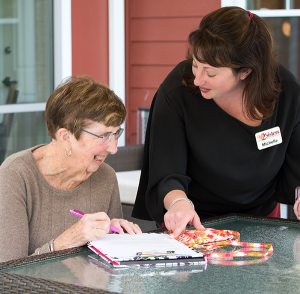
My sister, Alyson, and I are experienced, Senior Care Advisors. So we wouldn’t blame you for assuming that all decisions we make on behalf of our parents come easily, one hundred percent of the time.
We wouldn’t blame you… but you’d be wrong. That’s because when it comes to home care, the road to finding the right match can be a bumpy one!
In the case of our parents, we were looking for someone(s) who could come in daily to help our dad. He has Parkinson’s and we wanted to provide some relief for our mom who had been acting as his sole caregiver.
It hasn’t been easy or straightforward. There is little regulation and a lot of variation in the way home care agencies operate and staff. Also, because home care services are provided one-on-one, it’s especially important to make sure there is a good match.
It took us a bit of time, but after some trial and error, we finally found the right support for our dad. Unfortunately, thanks to the upheaval of the pandemic, his caregivers are no longer available and the process will likely have to begin again.
As you can see, it can be exhausting! There are, however, some key factors that we have learned and that we share with you below in making your own decisions.
Overall, we recommend working with an agency as opposed to hiring someone directly (more on why below). A great place to start is by checking out the Home Care Alliance of Massachusetts, a trade association of accredited home care and home health agencies. Here, you can search based on location and other parameters.
Once you’ve narrowed the list of potential agencies, here are four important questions to ask. (Note that this list does not include questions that need answering regarding care capabilities or COVID-19 operating procedures.)
Question #1: Tell me about your caregivers.
High quality marketing and charismatic agency leaders are fine. But this has little to do with the people who will actually be coming into the home. An agency is only as good as its caregivers.
So, ask about screening practices, background checks, language proficiency and average tenure with the company. Are both medical and nonmedical staff available to match evolving care needs? What type of health benefits, sick leave, or childcare support are aides given? Feel free to inquire, too, about caregiver compensation and retention.
While there isn’t a perfect correlation, the companies that take the best care of their staff are going to attract the best people to their team. I’ve said this before and I will say it again, happy staff equals happy clients!
Question #2: How is scheduling and staffing managed?
There may be a team of caregivers coming to the home at different times and on different days. Each agency will have its own system to coordinate this, often under the direction of a Client Care Coordinator (or similar position).
Ask who is in charge and request to speak directly with that person. How long have they been on the job? Do you get the impression they like where they work? Is this someone you think you can work with? When issues arise — and some will arise — do you think this person will listen to your concerns, take ownership, and work with you to resolve conflicts?
Perfection isn’t the goal — which is a good thing, since it won’t happen! Just make sure you feel like you’ve got a partner you can trust and who will strive to make adjustment as needed.
Question #3. What is the back-up plan?
Caregivers get sick, change jobs, get delayed by inclement weather, etc. Plus, they have family needs of their own, especially during this pandemic. Things can happen at a moment’s notice that disrupt in-home care coverage. What then?
What happens if last minute coverage is needed for a shift in the middle of the night? Are the phones answered by an answering service? An agency employee? Or will you have to leave a message and wait until morning to speak to someone who can take action? What do they do if they can’t find a replacement? What if there is a weather emergency?
Life happens 24/7. Find an agency that has this reality baked into the way they staff and operate.
Question #4: How does communication work?
The aides come and go, but you’re not there to supervise (that’s the whole point). So how do you know what’s going on behind the scenes? Further, how does the aide who arrives at 11 p.m. know what kind of day your mom had, or which of her medications she’s already taken?
The common answer is a “care log.” Back in the day, when Alyson worked as a home health aide, there was a notebook that stayed in the home and that each aide used to make comments throughout a shift. Today, this is often some type of electronic logging system or an app that updates in real time.
Whatever the specifics, there needs to be a process for open lines of communication among all those involved, so that caregivers can provide smooth and reliable care.
Final Thoughts
As mentioned earlier, when you consider all the responsibilities that an agency takes on in providing qualified caregivers, you can see why we don’t recommend hiring directly. Not to mention the comfort of knowing they are bonded, insured, employ background checks, and carry the proper workers compensation insurance.
But even under the best of circumstances, the unfortunate truth is that bringing in home care represents a loss of independence and a change in routine. Few people, especially seniors, are eager to have strangers in their home.
Fortunately, with some perseverance and a willingness to ask the specific questions above, you can find your way to a home care solution that works for both you and your loved ones.